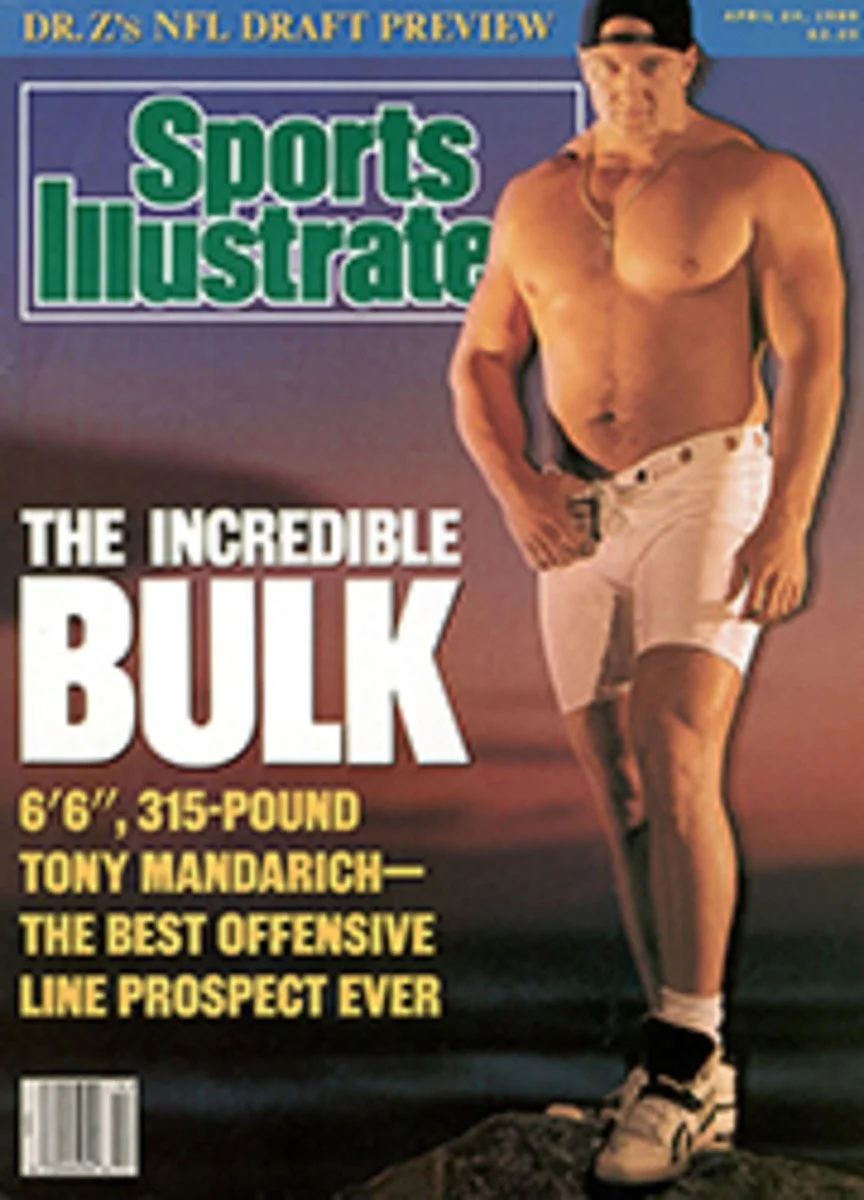Revisiting One of the Worst Draft Mistakes in Sports History
Tony Mandarich on the cover of Sports Illustrated ahead of the 1989 NFL draft. (Photo Credit: Sports Illustrated Vault)
The 1989 NFL draft featured several Hall of Fame talents in the first round including Troy Aikman, Barry Sanders, Derrick Thomas, Deion Sanders, and Steve Atwater. This class would prove to be very top heavy as four out of those five Hall of Famers were drafted in the first five picks of the draft. The Dallas Cowboys drafted quarterback Troy Aikman first overall which marked the beginning of a Cowboys dynasty when Aikman would end up leading the Cowboys to three Super Bowl wins in 1993, 1994, and 1996. Barry Sanders was selected by the Detroit Lions and immediately became one of the most productive and electric running backs to ever carry a football. Although Sanders’ Lions did not have the same team success as Aikman’s Cowboys as the Lions would fail to ever reach a Super Bowl with Sanders (and have not ever reach one at all), a case could be made that a prime Barry Sanders is the greatest running back to ever live. At the very least, he easily belongs in the conversation and is among the five greatest running backs ever.
One pick later, the Chiefs selected edge rusher Derrick Thomas at fourth overall. Thomas would go on to become one of the best pass rushers in the league almost immediately as in just his second year, he recorded 20 sacks in the season and a whopping seven in a single game in week 10 versus the Seattle Seahawks. His career would tragically be cut short after the 1999 season due to his death in January 2000. But his 11 seasons were enough for him to compile 126.5 sacks, two first-team all-pro’s, and three second-team all-pro’s. At fifth overall, the Falcons chose Deion Sanders, a name that pretty much speaks for itself. Deion “Prime Time” Sanders remained the same guy in the league as he was pre-draft: an extremely self-confident guy that could easily be considered arrogant that always backed it up in his performance.
Sanders could make the case as the most flashy and electric player of all time with his incredible speed and endurance, which allowed him to excel at his normal defensive back position, as a kick returner on special teams, and even at wide receiver at times. He would finish his career with a defensive player of the year award in 1994, six first-team all-pro’s, two second-team all-pro’s, and is still widely considered among the best, if not the best, defensive backs to ever live.
So then that leaves the second overall pick of the 1989 draft. Why was his NFL legacy not discussed along with the four Hall of Famers that he was drafted right in between? Well, that’s because his legacy is being one of the biggest draft busts in the history of the NFL. The Green Bay Packers unfortunately drafted offensive tackle Tony Mandarich with the second overall pick in the draft. To be fair to Green Bay, Mandarich, also known as “The Incredible Bulk” was widely considered the best offensive tackle prospect in history due to his Hulk-like strength and incredible athleticism for his size.
At the time, almost nobody questioned the pick. Mandarich absolutely showed generational talent during his college days and at the NFL combine, where he ran an official 4.65 40-yard dash despite being 6’6” and 325 pounds. However, the Packers would quickly discover Mandarich’s character and attitude issues that would prove to be an issue in the locker room. He would begin his career by holding out due to a contract dispute until just the week before week 1 of the 1989 NFL regular season. These issues can be summed up in a nutshell by his infamous quote: "I am not like other players, I am Tony Mandarich, and they have to understand that. If they don't like it, that is just the way I am and they are going to learn to like it." Yeah… that’s probably not how a rookie should introduce himself to the NFL, especially when he would never back it up on the field.
Mandarich’s mediocre-at-best play would quickly result in steroid use rumors from the media and fans. Although these rumors were denied by Mandarich for nearly two decades, he would admit to using steroids in college where he gained his strength. He also admitted to having a painkiller and alcohol addiction while playing for the Packers, which destroyed his motivation. His poor performance would result in him being cut by the Packers in 1992 after just four seasons.
To his credit, Mandarich did somewhat revive his career on the Indianapolis Colts where he played for three years from 1996-1998 after becoming sober in 1995. He has also taken responsibility for his poor choices that resulted in him being labeled as one of the biggest busts in NFL history. He wrote a book called My Dirty Little Secrets- Steroids, Alcohol, and God that was published in 2009 where he detailed his addictions that contributed to his career sputtering out in Green Bay.
From a pure sports perspective, this situation does beg the question: how would Packers history be different had they not passed on all three consecutive Hall of Famers that were drafted right after Tony Mandarich? Would they still have traded for Brett Favre? If so, what would an offense look like where Favre hands the ball to Barry Sanders throughout both of their primes? How good would the Packers’ defense have been had they drafted Derrick Thomas or Deion Sanders? Most importantly, how many Super Bowls would they have won in the 90’ since they already won one in 1997 and made it back to the big game the very next year in 1998? For better or for worse, the world will never know.
